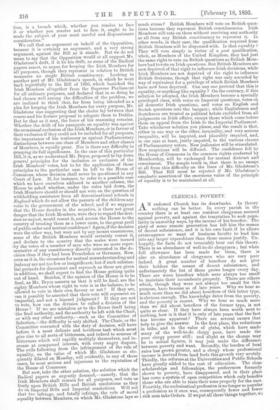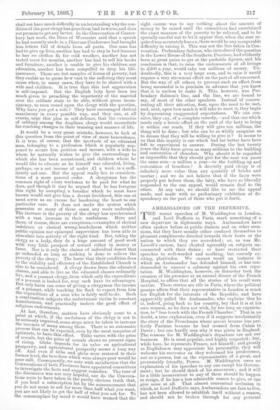CLERICAL POVERTY.
AN endowed Church has its drawbacks. In theory- nothing can be better. In every parish in the country there is at least one resident clergyman secured against poverty, and against the temptation to seek popu- larity in unworthy ways, by the income of his benefice. The piety of some remote generation has left him the means of decent subsistence, and it is his own fault if he allows extravagance or want of business faculty to lead him into any larger expenditure than those means justify. Un- happily, the facts do not invariably bear out this theory. There is an abundance of well-to-do clergymen ; but when full allowance has been made for them, there is also an abundance of clergymen who are very poor indeed. A great number of benefices do not give their holders the means of decent subsistence, and unfortunately the list of them grows longer every day. There are some benefices which were always too small to maintain their incumbents properly. There are others which, though they were not. always too small for this• purpose, have become so of late years. Why we hear so. much more than we did about benefices of this latter type, is obvious enough. The knowledge dates from the poverty, and the poverty is recent. Why we hear so much more than we did. about benefices of the former type, is not quite so clear. If they have always been worth next to nothing, how is it that it is only of late years that the fact has become apparent ? There are several causes that help to give the answer; In the first place, the reductions in tithe, and in the value of glebe, which have made many of the well-to-do clergy poor, have made the poor clergy poorer still ; and slight as the change may be in actual figures, it may just make the difference between poverty and want. Secondly, the burden of local rates has grown greater, and a clergy whose professional income is derived from land feels this growth very acutely. Thirdly, the reforms at the Universities and Public Schools have greatly added to the cost of education. The close scholarships and fellowships, the preferences formerly shown to poverty, have disappeared, and in their place has come a system of open competition which only benefits those who are able to train their sons properly for the race.
i Fourthly, the ecclesiastical profession s no longer so popular a profession as it once was, consequently fewer and fewer rich men take Orders. If we put all these things together, we shall not have much difficulty in understanding why the con- dition of the poor clergy has gonefrom bad to worse, and does notpromise to get any better. In the Convocation of Canter- bury last week, the Dean of Worcester said that a speech he had recently made in a Diocesan Conference had brought him letters full of details from all parts. One man has had to give up fires, another has had to stay in bed because he has no clothes fit for cold weather, another has not tasted meat for months, another has had to sell his books and furniture, another is unable to give his children any education, another has been compelled to drop his life- insurance. These are but samples of forms of poverty, but they enable us to guess how vast is the suffering they must cause when, in many cases, they have to be shared with a wife and children. It is true that this last aggravation is self-imposed. But the English laity have been too much given to preaching the superiority of the married over the celibate state to be able, without gross incon- sistency, to turn round upon the clergy with the question, Why have you got a wife ? They have encouraged clerical matrimony in every possible way, and they can, at all events, urge this plea in self-defence, that the extension of celibacy among the Anglican clergy would necessitate far-reaching changes in their training and manner of life.
It would be a very great mistake, however, to look at this question from the point of view of mere benevolence. It is true, of course, that the spectacle of an educated man, belonging to a profession which is popularly sup- posed to secure him position and income, with a wife to whom he naturally wishes to give the surroundings to which she has been accustomed, and children whom he would like to educate as he himself was educated, living, perhaps, on a net income of under ..t1 a week, is a suffi- ciently sad one. But the appeal really lies to considera- tions of a more general order. A clergyman has the common right of every workman to be paid for what he does, and though it may be argued that he has foregone this right by accepting a benefice which he must have known would not give him a decent livelihood, this can at most serve as an excuse for hardening the heart to one particular case. It does not make the system which generates so many of these cases any more endurable. The increase in the poverty of the clergy has synchronised with a vast increase in their usefulness. Here and there, of course, there are exceptions,—examples of clerical indolence or clerical wrongheadedness which neither public opinion nor episcopal supervision has been able to stimulate into activity of the right kind. But, taking the clergy as a body, they do a huge amount of good work with very little prospect of reward either in money or fame. Nor is it only the claims of individual desert that go unheeded so long as nothing is done to relieve the Poverty of the clergy. The harm that their condition does to the stability and efficiency of the Established Church is also to be considered. A clergy drawn from the educated classes, and able to live as the educated classes ordinarily live, and a peasant clergy, from which only the expenditure of a Peasant is looked for, may each have its advantages. But only harm can come of giving a clergyman the income 0.f a peasant, while teaching his flock to expect from him the expenditure of a man who is fairly well-to-do. Such a combination subjects the unfortunate victim to constant hurni nations, and practically undoes the good effect of religious endowments At last, therefore, matters have obviously come to a point at which, if the usefulness of the clergy is not to be seriously impaired, the incomes of maired, some steps must be taken to increase process that can bsenyexame°ngd them. There is no automatic optimists, to have this frcte , even. by the most sanguine of of cereals, but the price effect, Tithe varies with the price of rising. Glebe depends odf cereals shows no present signs prosperity, and agricultValior its value on agricultural prosperity seems a long way off. And even if tithe and glebe were restored to their former level, the benefices which- were always poor would be poor still. Consequently, we note with satisfaction that the Convocations of both Provincesave appointed committees to investigate the facts and suggest the discussion was not very hopeful, The tone of , nor do the Convoca- tions seem to have taken in the pretty obvious truth that, if you head a subscription list by the announcement that you do not mean to ask for more than half what you want, you are not likely to get the half of what you ask for. To the commonplace lay mind it would have seemed that the right course was to say nothing about the amount of money to be raised until the committees had ascertained the exact measure of the poverty to be relieved, and. to be specially careful not to let it appear that, when the sum re- quired was accurately known, there would be any insuperable difficulty in raising it. This was not the line taken in Con- vocation. Prebendary Salmon, who introduced the question in the Lower House of the Southern Province, had evidently been at great pains to get at the probable figures, and his conclusion is that, to raise the endowments of all livings to £200 a year, would take ten millions of money. Un- doubtedly, this is a very large sum, and to raise it would require a very strenuous effort on the part of all concerned. But the way of all others to prevent such an effort from being successful is to proclaim in advance that you know that it is useless to make it. This, however, was Pre- bendary Salmon's line, and the line, we are bound to say, of most of the other speakers. Instead of concen- trating all their attention, first, upon the need to be met, and, next, upon how much it will take to meet it, they begin by deprecating exaggerated expectations. We can con- ceive, they say, of a complete remedy,—and. that one which needs only a heroic effort on the part of the laity to bring it within our reach. If they will give ten millions, the thing will be done; but who can be so wildly sanguine as to dream that they will be willing to give it ? it seems to us that this inquiry is one which had far better have been left to experiment to answer. During the last twenty years the laity have given as many millions to the building and restoration of churches. Why should it be regarded as impossible that they should give for the next ten years the same sum—a million a year—to the building up and restoration of benefices ? A decently paid clergy is of infinitely more value than any quantity of bricks and mortar ; and. we do not believe that if the facts were properly put before them, the laity, who have so liberally responded to the one appeal, would remain deaf to the other. At any rate, we should like to see the appeal made, and made with no preliminary exhibition of de- spondency on the part of those who put it forth.



































 Previous page
Previous page